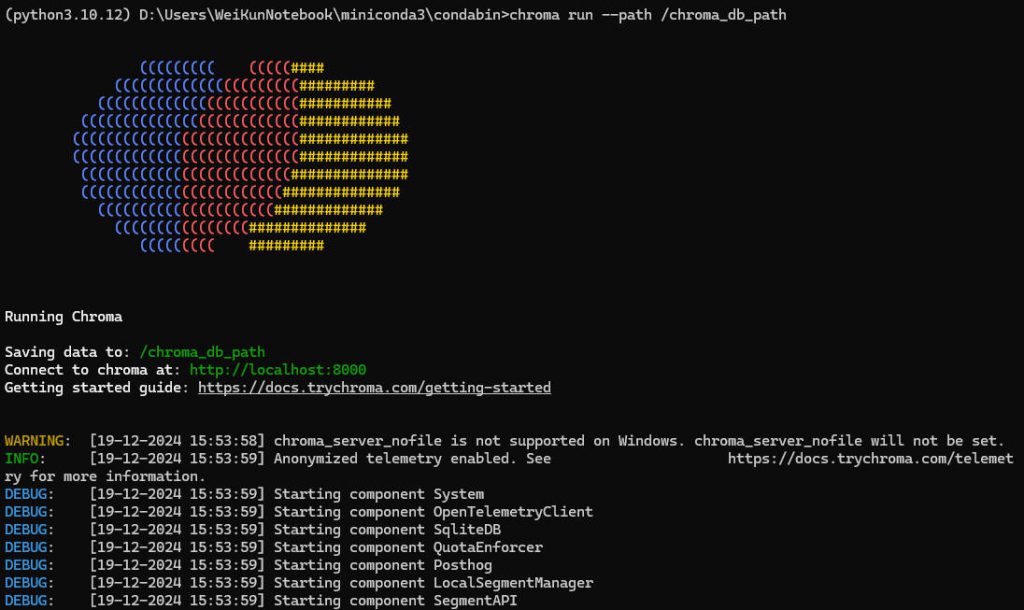- 1:1.简介
- 2:2.与其他向量数据库对比
- 3:3.安装chroma
- 4:4.启动
- 4.1:1.作为服务端启动
- 4.2:2. 作为嵌入数据库
- 4.3:3.作为客户端启动
- 4.4:4.作为异步客户端
- 5:5.collection
- 6:6.数据增删改查
- 7:7.设置embedding function
1.简介
Chroma 是 AI 原生开源矢量数据库。Chroma 通过为 LLM 提供知识、事实和技能,使构建 LLM 应用程序变得容易。同时也是实现大模型RAG技术方案的一种有效工具。

- Chrome提供以下能力:
- 存储嵌入类型数据(embeddings)和其元数据
- 嵌入(embed)文档和查询
- 对嵌入类型的检索
- Chrome 的原则:
- 对用户的简单性,并保障开发效率
- 同时拥有较好的性能
在Python环境中,Chroma可以在Python脚本中作为客户端、服务端或者直接作为嵌入式向量数据库(数据可以在内存中或磁盘)使用。
在其他环境中目前只能作为客户端使用。
从源码中可以看到Chroma作为服务端的时候是fastapi写的接口。
2.与其他向量数据库对比
chroma与商业向量数据库比起来,无论是性能还是存储规模都是比较低,所以一般用来作为产品初期功能验证时候使用,如果你的数据量不大也不需要经常更新的情况,产品中也是可以使用的。这里的数据规模一般指存储的数量条数在100k以下,按每条500~800字算的话,可以承载100k*650=65M字,用来作为企业内部知识库一般也是足够的,如果用来存放用户自己上传的数据,那就不行了,容纳不了太多用户。

3.安装chroma
- 在python环境中使用pip进行安装即可
pip install chromadb
- 在docker中安装
docker pull chromadb/chroma docker run -p 8000:8000 chromadb/chroma 或者从GitHub下下载源码,通过源码中的dockerfile安装 git clone git@github.com:chroma-core/chroma.git cd chroma docker-compose up -d --build
4.启动
1.作为服务端启动
在python环境中执行下面的命令,--path后面跟的参数是路径参数,是指数据持久化存放的位置,--host是主机地址,一般写127.0.0.1或0.0.0.0,--port是服务端口
chroma run --path xxx --host xxx --port xxx

2. 作为嵌入数据库
import chromadb client = chromadb.PersistentClient(path="/path/to/save/to")
3.作为客户端启动
import chromadb chroma_client = chromadb.HttpClient(host='localhost', port=8000)
4.作为异步客户端
import chromadb
chroma_client = await chromadb.AsyncHttpClient(host='localhost', port=8000)
如果需要让chroma作为服务端并跟随python程序启动/关闭,可以使用下面的代码
class StartChromaServer:
def __init__(self):
self.__command = ["chroma", "run", "--port", str(CHROMA_DATABASE_PORT), "--path", CHROMA_DATABASE_PATH]
self.__process = subprocess.Popen(self.__command, stdout=subprocess.DEVNULL, stderr=subprocess.DEVNULL)
print(f'chroma server start.PID:{self.__process.pid}')
atexit.register(self.close_external_program)
def close_external_program(self):
if self.__process.poll() is None:
self.__process.terminate()
print('chroma server close.')
StartChromaServer()
5.collection
chroma使用collection作为管理数据的基本单元,可以创建、查询、删除collection
创建collection
import chromadb chroma_client = chromadb.Client() collection = chroma_client.create_collection(name="my_collection") #或者使用另外一种更安全的方式 collection = chroma_client.get_or_create_collection(name="my_collection")
查询collection
import chromadb chroma_client = chromadb.Client() collection = chroma_client.get_collection(name="my_collection")
删除collection
import chromadb chroma_client = chromadb.Client() chroma_client.delete_collection(name="my_collection")
6.数据增删改查
在拿到collection后,就可以在该collection下对数据增删改查了。
插入
collection.add(
embeddings=[[1.2, 2.3, 4.5], [6.7, 8.2, 9.2]],
documents=["This is a document", "This is another document"],
metadatas=[{"source": "my_source"}, {"source": "my_source"}],
ids=["id1", "id2"]
)
查询
results = collection.query(
query_texts=["This is a query document"],
n_results=2
)
更新
collection.update(
ids=["id1", "id2", "id3", ...],
embeddings=[[1.1, 2.3, 3.2], [4.5, 6.9, 4.4], [1.1, 2.3, 3.2], ...],
metadatas=[{"chapter": "3", "verse": "16"}, {"chapter": "3", "verse": "5"}, {"chapter": "29", "verse": "11"}, ...],
documents=["doc1", "doc2", "doc3", ...],
)
若不存在则新增
collection.upsert(
ids=["id1", "id2", "id3", ...],
embeddings=[[1.1, 2.3, 3.2], [4.5, 6.9, 4.4], [1.1, 2.3, 3.2], ...],
metadatas=[{"chapter": "3", "verse": "16"}, {"chapter": "3", "verse": "5"}, {"chapter": "29", "verse": "11"}, ...],
documents=["doc1", "doc2", "doc3", ...],
)
删除
collection.delete(
ids=["id1", "id2", "id3",...],
where={"chapter": "20"}
)
7.设置embedding function
如果我们在代码中实现了文本转向量的工作,我们在使用chromadb的时候可以使用参数embeddings=[[],[],...]即可,chromadb库同时也提供了它内部实现的方式,检测到我们传入的参数只有文本的情况下它会自行调用我们设置的embedding function。
自定义嵌入方法
class OpenaiEmbeddingFunction(EmbeddingFunction):
def __init__(self):
key = OPENAI_API_KEY
url = "http://xxxxxx.com/v1"
self.key = key
self.url = url
def __call__(self, input: Documents) -> Embeddings:
embeddings = OpenAIEmbeddings(
model="text-embedding-3-small",
openai_api_base=self.url,
openai_api_key=self.key,
)
return embeddings.embed_documents(input)
self.__EMBDEDDING_FUNC = OpenaiEmbeddingFunction()
#在获取collection的时候把自定义的方法作为参数传入
collection = await chroma_client.get_or_create_collection(
name=user_id,
embedding_function=self.__EMBDEDDING_FUNC,
metadata=self.__DEFAULT_METADATA,
)
更多内容可以查阅chroma的官网、非官网文档
https://docs.trychroma.com/
https://cookbook.chromadb.dev/
